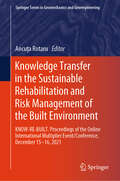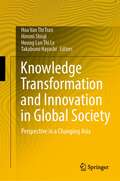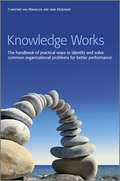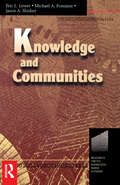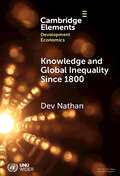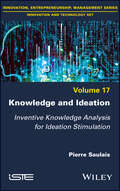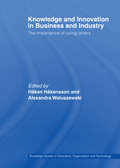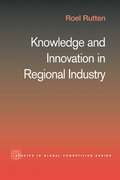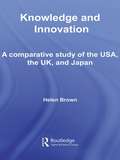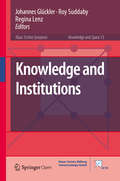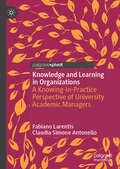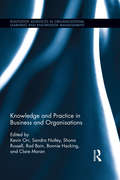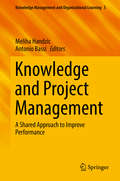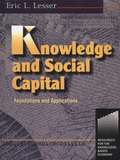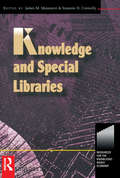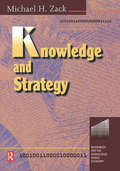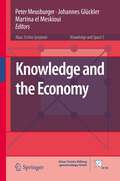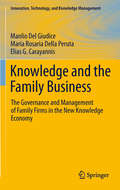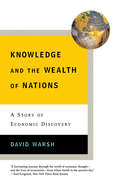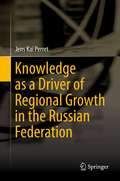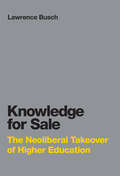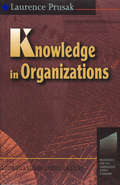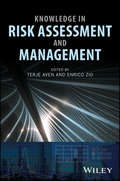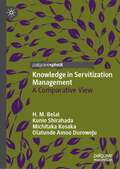- Table View
- List View
Knowledge Transfer in the Sustainable Rehabilitation and Risk Management of the Built Environment: KNOW-RE-BUILT. Proceedings of the Online International Multiplier Event/Conference, December 15-16, 2021 (Springer Series in Geomechanics and Geoengineering)
by Ancuța RotaruThis book showcases the valuable contributions made during the online event entitled The International Conference on Knowledge Transfer in the Sustainable Rehabilitation and Risk Management of the Built Environment. The conference was held on December 15–16, 2021, and was organized as a multiplier event of the European project Rehabilitation of the Built Environment in the Context of Smart City and Sustainable Development Concepts for Knowledge Transfer and Lifelong Learning (RE-BUILT). This book specifically retains the same main themes explored in the book titled Critical Thinking in the Sustainable Rehabilitation and Risk Management of the Built Environment – CRIT-RE-BUILT. The papers included in this book are mostly authored by partners in the project’s consortium and cover various aspects of civil engineering knowledge transfer in crucial areas, to address different perspectives and significant challenges related to the sustainable built environment. The book seeks to provoke ideas and discussions, particularly in the areas where risk management and sustainable rehabilitation of the built environment intersect, ranging from reducing hazard risks to enhancing sustainable rehabilitation efforts in the field
Knowledge Transformation and Innovation in Global Society: Perspective in a Changing Asia
by Takabumi Hayashi Hiromi Shioji Hoa Van Thi Tran Huong Lan Thi LeThis is the first book to fully explain the changing management and business models in the current era of important new developments in knowledge and information occurring all over the world. The research and its outcomes presented here focus especially on diverse cases from emerging countries in East Asia, where local companies face similar technological change.The pandemic has seriously changed people's lives and affected the development of society as a whole, while digital technologies have become even more greatly in demand. Those are very difficult to fit into traditional management models created decades ago, however. For the successful implementation of such a transition, new paradigms, models, and technologies for the transformation of control systems are needed. To meet that need, a new paradigm to bring about innovation under the new knowledge transformation system is required.This book presents the experiences of beginning such a knowledge transformation inEast Asian countries. Despite the fact that the countries are in the same geographical region, their experiences are quite diverse, determined by cultural, historical, religious, and psychological factors. These differences appear not only in such important areas as R&D processes, but also in production, finance, HR management, and marketing. Readers will find innovative solutions for the transformation of management in the new knowledge transformation system that is the focus of this book.
Knowledge Work Processes
by Thomas H. DavenportA time-honored way of improving any form of work is to treat it as a process. This process-based approach to performance, however, has not been widely applied to the arena of knowledge work. If managed correctly, process orientation can make knowledge work more productive and empowering. This chapter describes the most effective process interventions for different types of knowledge work. This chapter is excerpted from "Thinking for a Living: How to Get Better Performance and Results from Knowledge Workers."
Knowledge Works
by Christine Van Winkelen Jane MckenzieKnowledge Works is a handbook full of ideas to help you draw on people's knowledge to keep ideas fresh, reduce waste, and build competence and capability. You can either dip into it according to your needs, or work through it in a more systematic way to create a plan to improve your organization's performance."Knowledge Works is a very practical book that provides proven solutions for important knowledge-related problems in organizations including: how to convince managers that knowledge is important, how to create a knowledge-sharing culture, and how to improve the quality of conversations. A must-read for all managers of knowledge-intensive organizations."Daan Andriessen, Professor of Intellectual Capital, Inholland University of Applied Sciences, The Netherlands "To be successful as a manager, you need to make better decisions, be more innovative and to do more with less. In this highly practical handbook, Christine Van Winkelen and Jane McKenzie offer new ideas to challenge your current thinking and achieve this. Their work is soundly based on 10 years collaborative research with the Knowledge Management Forum at the Henley Business School."David Gurteen, Founder and Director, Gurteen Knowledge Community"This book shows in a very inspiring and hands-on way how knowledge works. This is an utmost important understanding in the growing intellectual economy for increased operational knowledge effectiveness. The book has in an impressive way systematized many challenging K-works perspectives, from knowledge mapping and flows to social media and knowledge creating conversations. It is demonstrating a number of insightful real life stories and projects during 10 years of the Henley KM Forum, as well as providing valuable reading notes. Happy Knowledge Work ..."Leif Edvinsson, Honorary Chairman for the Henley KM Forum, The World´s First Professor of Intellectual Capital
Knowledge and Communities
by Eric Lesser Michael Fontaine Jason SlusherKnowledge and Communities is the first book dedicated to a major new knowledge management topic. "Communities of Practice" are cross-organizational groups of people sharing knowledge, solving common problems, and exchanging insights and frustrations. Knowledge and Communities, a collection of authoritative articles, describes the dynamics of these groups and explains how they enable organizational knowledge to be creating, shared, and applied. The book teaches how organizations can empower both traditional and on-line communities and make them a cornerstone of a general knowledge management strategy. Readers will learn how communities can help unify an organization and its external stakeholders, such as customers and suppliers, and how they can critically support an e-commerce strategy. Knowledge and Communities will help readers understand a primary vehicle for building an organization's social capital and competitive advantage.
Knowledge and Global Inequality Since 1800: Interrogating the Present as History (Elements in Development Economics)
by Dev NathanThe Element highlights the monopolization and exclusion from high-value knowledge in analysing divergent and, recently, partially convergent income trends across 200-odd years of the global capitalist economy. A Southern lens interrogates this history, in the process showing how developing command over knowledge creation sheds light on the middle-income trap. Overall, it shows a new way of looking at global capitalist economic history, highlighting the creation of, command over and exclusion from knowledge. This forces us to analyse the role of the subjective or agential element in making history; a subjective element that, however, always works from within and transforms existing structures and processes. This title is also available as Open Access on Cambridge Core.
Knowledge and Ideation: Inventive Knowledge Analysis for Ideation Stimulation
by Pierre SaulaisOur world overwhelms us with more and more data everyday. Yet we need to face many challenges in order to deal with its complexity – notably to discern the essential from the accessory, to exploit quality and not quantity, to explore the depth of our knowledge and to produce from it, in a reasoned way, effective ideas to be put into action. A synthesis of a triple experience in industry, pedagogy and academia, Knowledge and Ideation presents numerous concepts, such as the dematerialized knowledge object, inventive intellectual heritage, inventive potential, and knowledge-based ideation. This book develops and describes applications in the form of case studies while proposing prospects.
Knowledge and Innovation in Business and Industry: The Importance of Using Others (Routledge Studies in Innovation, Organizations and Technology)
by Alexandra Waluszewski Håkan HåkanssonProvocative and reflective, this volume on the notion of knowledge and innovation in the business industry provides readers with a holistic approach to the subject of ‘knowledge’. Structuring their arguments around four case studies of innovation within four entirely different contexts, Håkansson and Waluszewski invite the business-minded reader to consider the costs of adopting new knowledge and innovation within a business setting. This book: questions the long-held assumption that new knowledge and innovation are universally advantageous follows the tremor of an innovation as new knowledge reverberates through, or is dampened by the larger economic community - including cultural structures, the industrial standards and the foundational assumptions that rule a particular economic domain focuses in particular on the interfaces where the innovative agent connects to its customers, suppliers and competitors. An ideal reference source for postgraduate students taking advanced courses in science and technology studies, innovation management, industrial marketing and purchasing, technological development and innovation systems.
Knowledge and Innovation in Regional Industry: An Entrepreneurial Coalition (Routledge Studies in Global Competition #Vol. 19)
by Roel RuttenThis superb new book develops a knowledge-based theory of innovation, marrying three streams of literature: innovation, inter-firm collaboration and networks, and learning regions. This book will interest all those working in economic geography and the economics of innovation.
Knowledge and Innovation: A Comparative Study of the USA, the UK and Japan (Routledge Studies In Innovation, Organizations And Technology Ser.)
by Helen BrownThis new book presents case studies from the US, the UK and Japan. Packed full of vignettes from cases studies and subscribing to a socio-cultural approach rather than the often tacit assumption that knowledge andtechnology transfer is a logistical problem, this excellent volume illuminates the often misunderstood process of knowledge transfer.A
Knowledge and Institutions (Knowledge and Space #13)
by Roy Suddaby Johannes Glückler Regina LenzThis open access book bridges the disciplinary boundaries within the social sciences to explore the role of social institutions in shaping geographical contexts, and in creating new knowledge. It includes theorizations as well as original empirical case studies on the emergence, maintenance and change of institutions as well as on their constraining and enabling effects on innovation, entrepreneurship, art and cultural heritage, often at regional scales across Europe and North America. Rooted in the disciplines of management and organization studies, sociology, geography, political science, and economics the contributors all take comprehensive approaches to carve out the specific contextuality of institutions as well as their impact on societal outcomes. Not only does this book offer detailed insights into current debates in institutional theory, it also provides background for scholars, students, and professionals at the intersection between regional development, policy-making, and regulation.
Knowledge and Learning in Organizations: A Knowing-In-Practice Perspective of University Academic Managers
by Fabiano Larentis Claudia Simone AntonelloThis book explores the notion of knowing-in-practice to unravel the formation of academic managers' knowing in a community university. It considers the unique socio-historical context and institutional intricacies, such as procedures, flows, and political and power structures. Knowing-in-practice implies that knowledge is dynamic, constantly in flux, and intricately linked to the capability for action within the social context. In essence, knowledge is emergent and anchored by its material context. The role of an academic manager is distinctive, involving the concurrent practice of higher education management and teaching. Hence, academic-managers are supposed to deal with a multiplicity of activities and interpersonal relationships. This work will enhance our understanding of the constitution process of academic-managers in higher education, emphasizing the perspective of knowing-in-practice. It offers insights into the learning processes and knowing associated with academic management, contributing to the improvement of university management and leadership. Further, it contributes to the advancement of organizational studies related to learning and knowing.
Knowledge and Practice in Business and Organisations (Routledge Advances in Organizational Learning and Knowledge Management)
by Kevin Orr Sandra Nutley Shona Russell Rod Bain Bonnie Hacking Clare MoranKnowledge and Practice in Business and Organisations contributes to scholarly understanding of knowledge and practice, mapping the conceptual terrain, providing a critical review of debates in the field and setting out key theoretical perspectives. Knowledge and practice are explored in a range of organisational and policy settings through six context-specific discussions. The collection helps shape the field, identify areas for future research inquiry, and suggest implications for practitioners. The range of sites of inquiry represented in the book (e.g. craft working, accounting, public sector organisations, creative industries, health care, and so on) make the book distinctive, enabling the reader to connect debates and ideas from across a range of sectors and disciplines. The book charts different currents of debate which have hitherto tended to remain unconnected. In one accessible volume, this book provides an excellent introduction to a set of concepts that have animated scholarly conversations across a range of disciplines and provides cases and examples of practices which come from beyond any one particular sector. Aimed at researchers and academics in the field, this book is valuable source, helping define and progress the scholarly debate.
Knowledge and Project Management
by Meliha Handzic Antonio BassiThis book argues that by integrating effective knowledge management (KM) with project management (PM), the overall project success rate can be improved significantly. It brings together the latest ideas and research on shared approaches to improve performance based on the research and experience of academics and practitioners. The structured collection of articles presents novel theoretical approaches and clear empirical evidence of the value of integrating the two distinct fields. It enables readers to better understand the need to merge KM with PM and appreciate the benefits. It also offers researchers an idea of what lies ahead and how to get there, and helps practitioners develop more suitable KM solutions for successful project outcomes.
Knowledge and Social Capital
by Eric LesserSocial capital - the informal networks, trust and common understanding among individuals in an organization - determines major competitive advantages in today's networked economy. Knowledge and Social Capital explains how social capital can drive collaboration, reconcile an organization's internal and external labor markets, and improve organizational effectiveness. This edited compilation of authoritative articles helps readers understand how they can build and capitalize on their own organizations' social capital. Knowledge and Social Capital teaches core principles and important strategies to a range of executives, including organizational development specialists, corporate strategists, and knowledge management professionals. Readers will learn how an organization can:
Knowledge and Special Libraries
by James Matarazzo Suzanne ConnollyFirst Published in 1998. Routledge is an imprint of Taylor & Francis, an informa company.
Knowledge and Strategy (Knowledge Reader Ser.)
by Michael H. ZackFirst Published in 1999. Routledge is an imprint of Taylor & Francis, an informa company.
Knowledge and the Economy
by Johannes Glückler Martina El Meskioui Peter MeusburgerThe broad spectrum of topics surrounding what is termed the 'knowledge economy' has attracted increasing attention from the scientific community in recent years. The nature of knowledge-intensive industries, the spatiality of knowledge, the role of proximity and distance in generating functional knowledge, the transfer of knowledge via networks, and the complex interplay between knowledge, location and economic development are all live academic issues. This book, the fifth volume in Springer's Knowledge and Space series, focuses on the last of these: the multiple relationships between knowledge, the economy, and space. It reflects the conceptual and methodological multidisciplinarity emerging from this scholarship, yet where there has up to now been a notable lack of communication between some of the contributing disciplines, resulting in lexical and other confusions, this volume brings concord and to foster interdisciplinarity. These complications have been especially evident in our understanding of the spatiality of knowledge, the part that spatial contexts play in knowledge creation and diffusion, and the relevance of face-to-face contacts, all of which are addressed in these pages. The material here is grouped into four sections--knowledge creation and economy, knowledge and economic development, knowledge and networks, and knowledge and clusters. It assembles new concepts and original empirical research from geography, economics, sociology, international business relations, and management. The book addresses a varied audience interested in the historical and spatial foundations of the knowledge economy and is intended to bridge some of the gaps between the differing approaches to research on knowledge, the economy, and space.
Knowledge and the Family Business
by Maria Rosaria Della Peruta Manlio Del Giudice Elias G. CarayannisFamily businesses--the predominant form of business organization around the world--can make numerous, critical contributions to the economy and family well-being in both financial and qualitative terms. But dysfunctional family businesses can be difficult to manage, painful experiences at best, and they can destroy family wealth and personal relationships. This book explores the dynamics of family business management, in the context of constantly changing market conditions and the role that knowledge management plays in strategic planning and adaptation. Integrating the literature from family business, entrepreneurship, industrial psychology, and knowledge management, and with illustrative examples from a variety of enterprises, the authors address such topics as: *How family businesses can compete in the new knowledge economy *How to manage a family business when knowledge is its main asset *How to transfer knowledge (and how to keep it alive) through family generations Within this framework, the authors argue that effective resource management--especially intangible resources--is central to enabling a family-run organization to maintain a sustainable competitive advantage over time. They note that families often develop systemic, intuitive, or tacit knowledge that transcends rational decision making and needs to be recognized and nurtured as a distinctive asset. The authors demonstrate that trans-generational value is achieved when the family firm innovates and adapts itself to changing external and internal conditions. This kind of entrepreneurial performance requires dynamic capabilities and processes designed to acquire, exchange, combine and even shed knowledge and practices; and, in turn, dynamic capabilities result from mechanisms of knowledge sharing, collective learning, experience accumulation, and transfer.
Knowledge and the Wealth of Nations: A Story Of Economic Discovery
by David Warsh"What The Double Helix did for biology, David Warsh's Knowledge and the Wealth of Nations does for economics."--Boston Globe A stimulating and inviting tour of modern economics centered on the story of one of its most important breakthroughs. In 1980, the twenty-four-year-old graduate student Paul Romer tackled one of the oldest puzzles in economics. Eight years later he solved it. This book tells the story of what has come to be called the new growth theory: the paradox identified by Adam Smith more than two hundred years earlier, its disappearance and occasional resurfacing in the nineteenth century, the development of new technical tools in the twentieth century, and finally the student who could see further than his teachers. Fascinating in its own right, new growth theory helps to explain dominant first-mover firms like IBM or Microsoft, underscores the value of intellectual property, and provides essential advice to those concerned with the expansion of the economy. Like James Gleick's Chaos or Brian Greene's The Elegant Universe, this revealing book takes us to the frontlines of scientific research; not since Robert Heilbroner's classic work The Worldly Philosophers have we had as attractive a glimpse of the essential science of economics.
Knowledge as a Driver of Regional Growth in the Russian Federation
by Jens Kai PerretThe Russian Federation has a history of more than twenty years of transformation to a market economy, but as well to a knowledge society, to look back on. This study takes a look at the knowledge generation, knowledge transmission and knowledge use inside the Federation since the early 1990s. Furthermore, in light of the high dependence of the Russian economy on the oil and gas sectors this study analyzes the impact knowledge related factors have on regional income generation following thereby in the direction of Schumpeterian growth theory. The study combines descriptive with empirical analyses to paint a picture as detailed as possible of the Russian knowledge society and its innovative potential.
Knowledge for Sale: The Neoliberal Takeover of Higher Education (Infrastructures)
by Lawrence BuschHow free-market fundamentalists have shifted the focus of higher education to competition, metrics, consumer demand, and return on investment, and why we should change this.A new philosophy of higher education has taken hold in institutions around the world. Its supporters disavow the pursuit of knowledge for its own sake and argue that the only knowledge worth pursuing is that with more or less immediate market value. Every other kind of learning is downgraded, its budget cut. In Knowledge for Sale, Lawrence Busch challenges this market-driven approach.The rationale for the current thinking, Busch explains, comes from neoliberal economics, which calls for reorganizing society around the needs of the market. The market-influenced changes to higher education include shifting the cost of education from the state to the individual, turning education from a public good to a private good subject to consumer demand; redefining higher education as a search for the highest-paying job; and turning scholarly research into a competition based on metrics including number of citations and value of grants. Students, administrators, and scholars have begun to think of themselves as economic actors rather than seekers of knowledge.Arguing for active resistance to this takeover, Busch urges us to burst the neoliberal bubble, to imagine a future not dictated by the market, a future in which there is a more educated citizenry and in which the old dichotomies—market and state, nature and culture, and equality and liberty—break down. In this future, universities value learning and not training, scholarship grapples with society's most pressing problems rather than quick fixes for corporate interests, and democracy is enriched by its educated and engaged citizens.
Knowledge in Organisations (Knowledge Reader Ser.)
by Laurence PrusakFirst Published in 1997. Routledge is an imprint of Taylor & Francis, an informa company.
Knowledge in Risk Assessment and Management
by Enrico Zio Terje AvenExciting new developments in risk assessment and management Risk assessment and management is fundamentally founded on the knowledge available on the system or process under consideration. While this may be self-evident to the laymen, thought leaders within the risk community have come to recognize and emphasize the need to explicitly incorporate knowledge (K) in a systematic, rigorous, and transparent framework for describing and modeling risk. Featuring contributions by an international team of researchers and respected practitioners in the field, this book explores the latest developments in the ongoing effort to use risk assessment as a means for characterizing knowledge and/or lack of knowledge about a system or process of interest. By offering a fresh perspective on risk assessment and management, the book represents a significant contribution to the development of a sturdier foundation for the practice of risk assessment and for risk-informed decision making. How should K be described and evaluated in risk assessment? How can it be reflected and taken into account in formulating risk management strategies? With the help of numerous case studies and real-world examples, this book answers these and other critical questions at the heart of modern risk assessment, while identifying many practical challenges associated with this explicit framework. This book, written by international scholars and leaders in the field, and edited to make coverage both conceptually advanced and highly accessible: Offers a systematic, rigorous and transparent perspective and framework on risk assessment and management, explicitly strengthening the links between knowledge and risk Clearly and concisely introduces the key risk concepts at the foundation of risk assessment and management Features numerous cases and real-world examples, many of which focused on various engineering applications across an array of industries Knowledge of Risk Assessment and Management is a must-read for risk assessment and management professionals, as well as graduate students, researchers and educators in the field. It is also of interest to policy makers and business people who are eager to gain a better understanding of the foundations and boundaries of risk assessment, and how its outcomes should be used for decision-making.
Knowledge in Servitization Management: A Comparative View
by Michitaka Kosaka Kunio Shirahada H. M. Belal Olatunde Amoo DurowojuThe last two decades have seen a shift towards service-based value in a process referred to as servitization. Manufacturers have been challenged to create relevant knowledge and adapt to this change. This book has two key purposes. First of all, the authors examine the theoretical underpinnings of knowledge management and servitization, before proposing a conceptual model for knowledge co-creation and organizational knowledge management processes. Then, the model is tested through a series of case studies from Japan and Malaysia, providing insight into experiences of business transformation from produce-centric to service-centric in developed and developing Asian economies. This book will be of interest to academics, students and practitioners in servitization, knowledge creation and knowledge management, especially those interested in Asian economies.
